► UK’s best hybrid cars on sale in 2025
► Our pick of the top part-electric buys
► Plug-in and self-charging hybrids covered
Accord to a September 2024 survey by the AA, drivers are four times as likely to choose a hybrid for their next car over a fully electric vehicle. So while not so long ago, hybrid technology was seen by some brands as a pointless stepping stone on the path to full electrification, many are now scrambling to re-establish their part-electric model lines. Plug-in hybrids especially, are seeing something of a resurgence.
All of this is great news if you’re in the market for an efficient – or fast – new car but don’t want to be limited by charging time or relative scarcity of charging points. The choice of hybrids is now vast, encompassing every size and shape of passenger vehicle on sale. Here at CAR we’ve driven them all, and on this page you’ll find our considered round-up of the very best.
The best hybrids at a glance:
The full list below covers hybrids of every type, from city cars to supercars. But if you already know what you want we also have articles specifically dedicated to the best self-charging hybrids, the best plug-in hybrids, and even the best mild hybrids. We’ve also covered the best hybrid SUVs and the best hybrid family cars, among other categories. And we have a guide to buying a used hybrid, as well as technical explainers. Keep reading.
Best hybrid cars in 2025
Below you’ll find our top picks across several main hybrid car categories, based on our testing expertise and our experience of the entire hybrid car market. Follow the links to read the full reviews.
Renault Clio E-Tech
Best hybrid small car – great for razzing it to shops, efficiently
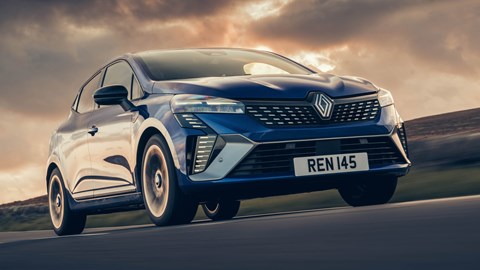
Pros: sharp steering, plush interior, 60mpg in the real world
Cons: can be clunky, non-hybrid even more fun
Updated in 2023 with revised styling and an even nicer interior, the Renault Clio successfully brings a bit of big-car posh to the small hybrid market. It’s a self-charging hybrid that claims to use F1-derived tech, but whatever the truth of that the headlines are 143bhp and a good dose of low-down torque – much meatier than the 106lb ft peak and 9.3sec 0-62mph time would suggest.
We’ve found the combined 1.6-litre petrol and electric motor can deliver 60mpg in real-world driving – impressively close to the official 67.2mpg WLTP economy claim. What’s more, it’s comfortable yet sharp to drive, with a pliancy that makes it a fine partner for UK roads. There’s plenty of passenger room, too, albeit at the expense of the relatively small boot.
To find out more, read our full Renault Clio review
Or try: Toyota Yaris (long-time small hybrid cheerleader); MG 3 Hybrid (low cost upstart a pleasant surprise)
Honda Civic
Best hybrid hatchback – high-tech, practical and fun
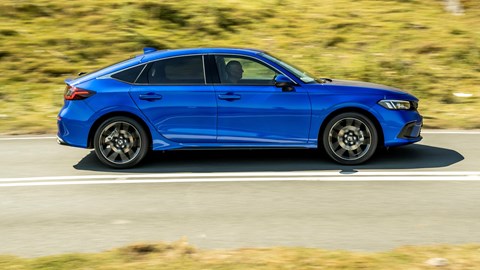
Pros: very slick hybrid system, spacious inside, sensible interior design
Cons: doesn’t actually come with a free bus pass
It felt like a bold move when Honda introduced the 11th generation Civic in 2021 and the only engine on offer was the e:HEV self-charging hybrid. And yet here we are in 2025, with diesel nearly dead and the 100 per cent electric revolution looking rather jaded already. Coming from a firm famous for its fizzy, high-revving powerplants, the e:HEV – which uses the e-motor to drive the wheels as much as possible – also seemed like a bit of a departure.
But on the road, this is a system that works really well. Smooth, powerful, quiet, it suits the assured handling and composure of the Civic very nicely, making this car a great companion on longer journeys at higher speeds as well as around town where its efficiency is most optimised. Not only have we seen over 50mpg in real-world testing, you’ll be getting a practical and fun to drive car as well.
To find our more, read our full Honda Civic review
Or try: Toyota Corolla (amazing real-world efficiency, sharp looks); Skoda Octavia 1.5 TSI e-TEC DSG (a mild hybrid that’s an all-round easy-going star)
Volkswagen Golf eHybrid
Best plug-in hybrid hatchback – smooth and comfortable
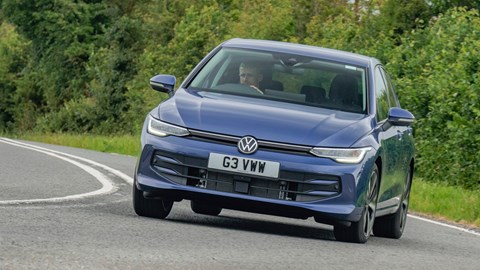
Pros: lengthy electric-only driving range, comfortable and very unruffled
Cons: could be faster – and will be once the GTE comes along
VW’s infotainment problems have been widely publicised, and the first thing to know about this eHybrid Golf is this area is much improved. And if you think that’s minor point, you’ve clearly not interacted with the previous system – where interacting is a synonym for wanting to rip it out of the dashboard and run it over. Twice. We digress. Back to the merits of this plug-in hybrid electric vehicle (PHEV).
We’ve picked the Golf as a top choice here because it is a comfortable, easy going driving companion that we’ve found capable of 72 miles of electric-only driving in real world testing. That’s slightly less than the 88-mile official figure, but so long the eHybrid will effectively function like a 100 per cent electric car for a lot of daily journeys – yet with the back-up of the TSI turbo petrol for longer trips. A proper return to form for VW.
To find out more, read our full VW Golf eHybrid review
Or try: Peugeot 308 (sharp, sexy, choice of two PHEV powertrains); Audi A3 (like a Golf, but more expensive)
BMW 330e
Best hybrid family car – get the Tourer for a ride that really does do it all
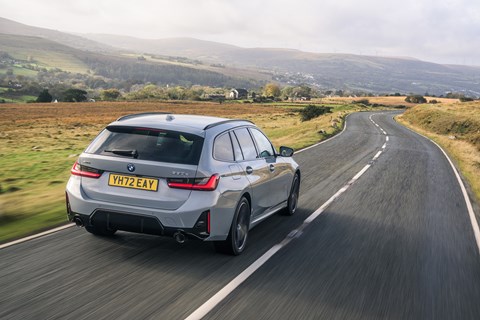
Pros: better to drive than any rival, crushingly efficient yet powerful, cheap BIK
Cons: a bit blunter than non-hybrid 3ers, the inevitable waiting list
What is there to say about the BMW 330e that hasn’t been already said? In terms of nails, hammers and hitting heads, there can have hardly been many greater examples of optimisation for the market in the history of the car. This thing looks good, handles its 289bhp well, does great mpg and is cheap to tax as a company car. In fact, the biggest problem you’ll have if you pick one is remembering where you parked it among the sea of identical examples outside work.
If you notice other motorists slowing down as they pass, it’s not to get a closer look – they’ll have seen hundreds on the journey already – it’s because they think you’re unmarked police. Still, from behind the wheel you’ll enjoy the comfortable, premium interior, as well as the PHEV system’s XtraBoost button and the fuel gauge that doesn’t move. The Touring is the ultimate family flex, too, even if rivals offer bigger boots. A very correct choice.
To find out more, read our full BMW 330e review
Or try: Skoda Superb iV (massive, efficient, more affordable); VW Passat eHybrid (ditto, but Volkswagen)
Mercedes-Benz E300de
Best large hybrid – sleek looks, lots of tech, ridiculous mpg
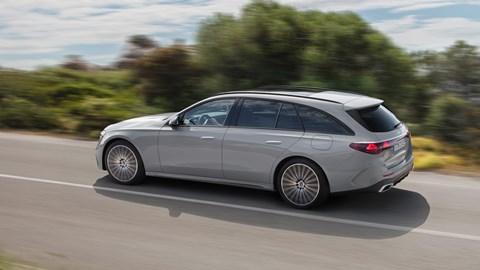
Pros: available as a diesel, available as an estate, awesome inside
Cons: not as dynamic as the 5-series, pricey Panamera beats it for comfort
It was tempting to go with another BMW here, but despite misgivings about the latest E-Class on early encounters – the ride on non-hybrid models was dreadful at launch in the UK – recent sessions with an estate have really won us over. This is a sublime looking large exec with an interior that, unlike other recent electrified Mercs, just about manages to steer clear of seeming like a Tokyo brothel at night, instead delivering an unignorable hit of high-tech modernity that drivers and passengers alike will adore.
You don’t have to have to the diesel PHEV; Mercedes sells a whole range of engines, including plug-in petrols. But if you do go for this 2.0-litre derv burner you’ll get great long-distance fuel economy even when the battery has run out. With it full there’s up to 70 miles of WLTP electric range, plus a stonking 516lb ft to go with the 309bhp. The battery does eat into the boot space a bit, but that’s just another excuse to buy the load lugger.
To find out more, read our full Mercedes E-Class Estate review
Or try: BMW 5-series hybrid (like the 330e, only bigger); Porsche Panamera e-Hybrid (astonishing air suspension, serious speed)
BMW 7-series
Best hybrid land yacht – if you want luxury and plug-in hybrid flexibility, start here
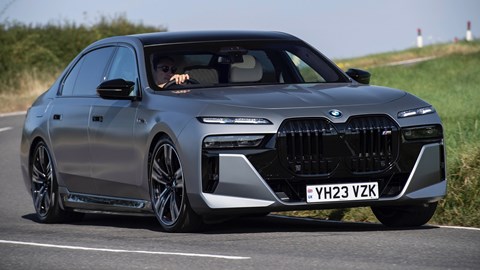
Pros: alluring balance between dynamics and luxury, funky options, top quality
Cons: exterior appears to be assembled from several different cars, e-range could be longer
One of the best things about being inside the latest BMW 7-series is that you can’t see the outside. ‘Challenging’ is probably the most diplomatic word for it. But from the cabin, you won’t care – for this is one fancy luxury range-topper, packed with crystalline control surfaces, superb finishing and, if you want it, a 31.3-inch cinema screen for rear-seat passengers. It’s got proper wow factor.
The 750e and M760e plug-in hybrids usefully straddle the line between the conventional combustion-engine models and the – very impressive – i7 electric car. You get a claimed 50-55 miles of electric range (think 40 a good result in real life), xDrive all-wheel drive and 483bhp or 563bhp to play with in total. It’s a big car but it’s well-balanced and as good to drive as it is relaxing to ride in.
To find out more, read our full BMW 7-series review
Or try: Mercedes-AMG S63 E-Performance (five-star super-limo with 1055lb ft); Range Rover PHEV (any road, anywhere, in comfort and style)
Ford Kuga Plug-in Hybrid
Best sensible hybrid SUV – drives better than you could possibly expect
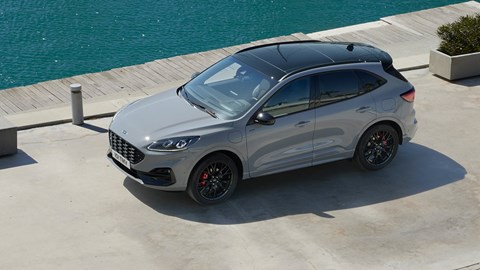
Pros: sweet blend of real-world fuel economy and classically sweet Ford driving chops, spacious
Cons: stiff ride, feels cheap inside
Most plug-in hybrid SUVs aren’t particularly fun to drive, and many don’t have particularly stellar fuel economy with a flat battery. That’s certainly not the case with the Kuga. We managed nearly 51mpg on a mix of roads including a stint on the A1(M). That’s about 10mpg better than the equivalent Kia Sportage achieved.
ST-Line models come with lower, stiffer suspension that provides an agile feel in bends, and there’s enough punch to cover ground at a reasonable lick. It doesn’t have the biggest all-electric range at around 31 miles in our tests, and while its interior is spacious it does feels rather low-rent.
To find out more, read our full Ford Kuga review
Or try: Honda CR-V (clever hybrid tech, nicely thought-out inside); MG HS (bang-on for a limited budget)
BMW X5 xDrive50e
Best premium hybrid SUV – you won’t believe the economy, and so forth
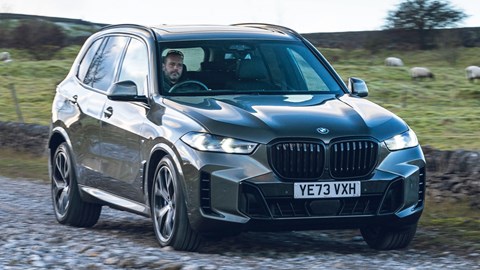
Pros: 50-mile real-world electric range, 35mpg without too much effort, best big SUV for all-round ability
Cons: saving the planet through brute technology, Cayenne goes even harder
The previous X5 plug-in hybrid was already impressive. Now as part of a midlife update, the xDrive45e has morphed into the xDrive50e, and in the process gained a useful bump in all-electric driving capability as well as a visual makeover. In out real-world testing we got 49 miles out of the battery pack before the 3.0-litre petrol engine kicked in – and that was in winter. On a fine summer’s day we’d expect to get even closer to the WLTP claimed 66-mile range.
We were also rather taken with the combined fuel economy, which saw us averaging nearly 35mpg – not at all bad in a bus this big and blunt looking. It’s fast, too, with 0-62mph taking just 4.8sec and 87mph achievable under electric power alone. While not quite as incisive to drive as the Cayenne referenced below, nor as compliant as the equivalent Range Rover, the X5 gets close enough to both assets to be a better all-rounder. Hence it won the CAR Giant Test.
To find out more, read our full BMW X5 review
Or try: Porsche Cayenne e-Hybrid (many levels of power and performance, huge fun); Range Rover Sport PHEV (sleek on the outside, lush on the inside)
Porsche 911 GTS T-Hybrid
Best hybrid sportscar – yes, Sherlock, adding an electric turbo to a 911 makes it even better…
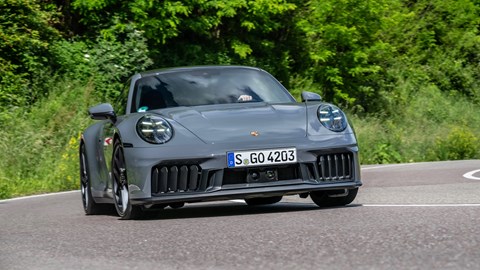
Pros: faster, more efficient, more authentic – a true advance for the 911
Cons: doesn’t exactly turn it into a fuel sipper
While the new Turbo-Hybrid technology at the heart of this latest 911 GTS won’t give you zero emissions capability, nor even get you over 30mpg WLTP, it does manage to make this hallowed sportscar even better to drive. By ditching one of the conventional turbos for an electric motor and adding a second between the engine and the gearbox, our Ben Barry reckons Porsche has given the 992.1 far more of a ‘naturally aspirated feel’.
So much so, in fact, that he’s questioning how the next GT3 will be able to top it. There’s not even a huge weight penalty, as the whole hybrid system weighs a relatively scant 40kg – in exchange for which you get 543bhp and 450lb ft, all with that classic 911 character intact. This is cake, eating it, then having ice cream
To find out more, read our full Porsche 911 GTS T-Hybrid review
Or try: waiting for the new BMW M5 (we’re reaching here)
Ferrari 296
Best hybrid supercar – but what’s more you now have a choice
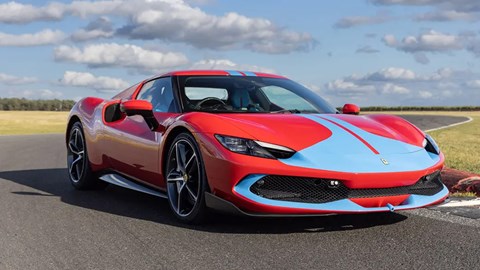
Pros: still brilliant to drive, hybrid power means 819bhp, coupe or convertible
Cons: we can’t help missing the V8…
See, we weren’t kidding about the supercars. There are a few to choose from now, in fact, not to mention a few new and used hypercars in the upper stratosphere. But keeping it relatively sane, if you’re a supercar buyer who wants to show a caring side, we’d recommend the majestic, magical Ferrari 296, which comes in GTB coupe or GTS convertible guises and proves that a modern prance horse no longer needs a minimum of eight cylinders.
The electric motor-assisted 3.0-litre V6 behind the passenger compartment makes 819bhp. Enough to get the 296 0-62mph in 2.9sec and on to a top speed of 205mph. More to the point, it is simply sensational to drive. And, yes, it’ll even creep around town silently using the battery (for a short distance, at least).
To find out more, read our full Ferrari 296 GTB review
Or try: McLaren Artura (no longer quite so likely to catch on fire); Lamborghini Revuelto (PHEV tech keeping the V12 alive, also 1001bhp)
Why buy a hybrid car?
Hybrid cars represent an easy-to-live-with, cheaper alternative fully electric vehicles.
Thanks to energy recuperation when braking and coasting, hybrid cars are more economical than traditional internal combustion cars, and most can creep silently around town on electric power. Lower CO2 emissions and high mpg figures make them cleaner and cheaper to run (especially as a company car).
Hybrid or plug-in hybrid?
We’ve got a separate page dedicated to the differences between types of hybrid, but the simple difference here is that regular hybrids – sometimes referred to as self-charging hybrids – don’t need to be plugged in at any point. Instead, the batteries that power their electric motors are recharged by energy recuperation when slowing down.
The other type of hybrid is the plug-in hybrid electric vehicle, often shortened to PHEV. As the name suggests, these can be plugged into the mains to recharge, so you’ll find an extra flap somewhere on the bodywork in addition to the fuel filler where the charging port is located.
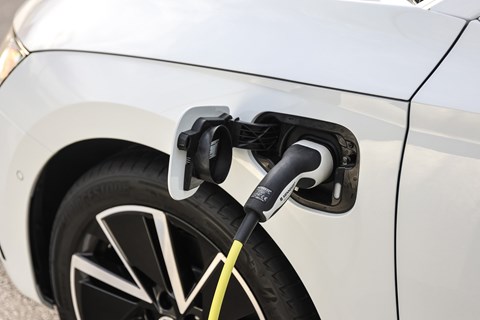
PHEVs have much larger battery packs and are at their most efficient when this is recharged routinely – much like a full EV. The bigger batteries give plug-in hybrids greater electric-only driving capability than self-charging hybrids; used efficiently, by regularly charging, many shorter journeys won’t need to trouble the internal combustion engine at all. This makes PHEVs cheaper to run, but if you don’t recharge them, they’re usually less efficient due to their hefty extra weight.
What’s the most reliable hybrid car in the UK?
While we’d be happy driving any of the above, for some buyers reliability is the primary consideration when choosing a car. And we’d strongly advise turning to Japanese or Korean brands if you’re after the most reliable hybrid car.
Toyota’s hybrid tech is extremely well established and rarely troublesome, making the Corolla, Yaris or RAV4 really top choices if reliability is your main concern. The Honda Civic and CR-V should be dependable, too, along with anything made by Lexus, Kia or Hyundai.
Buying secondhand? We have a round-up of the best used hybrid cars, too.
Are hybrid cars cheap to run?
Buying hybrid means you avoid the high purchase price of a pure battery electric vehicle (BEV) and potentially benefit from less expensive company car tax, VED, and Congestion Charge tolls to boot. Be sure to factor these into your calculations before you take the plunge.
Opting for a plug-in hybrid can make driving even cheaper. Since these tend to offer 30-40 miles of emissions-free travel, they can reduce multiple monthly trips to the fuel station, especially if you mostly do short journeys and are able to charge up at home overnight.
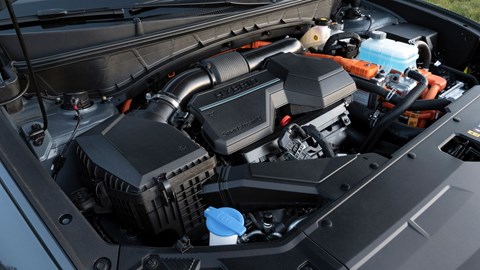
On the other hand, self-charging hybrids won’t need access to an electric car charger to make the most of them, and the latest models run on electric power alone a considerable amount of the time.
As ever, your driving style is an important deciding factor in how efficient your hybrid car will be. If you’re foot-to-the-floor everywhere, you’ll end up with high running costs no matter what you drive. Plan ahead and be measured with your inputs, and your running costs should fall accordingly.
Check out our list of the cheapest hybrid cars if you’re on a tight budget.